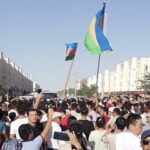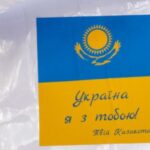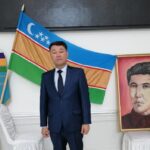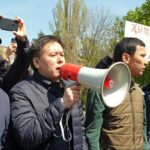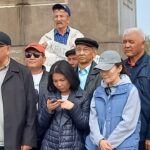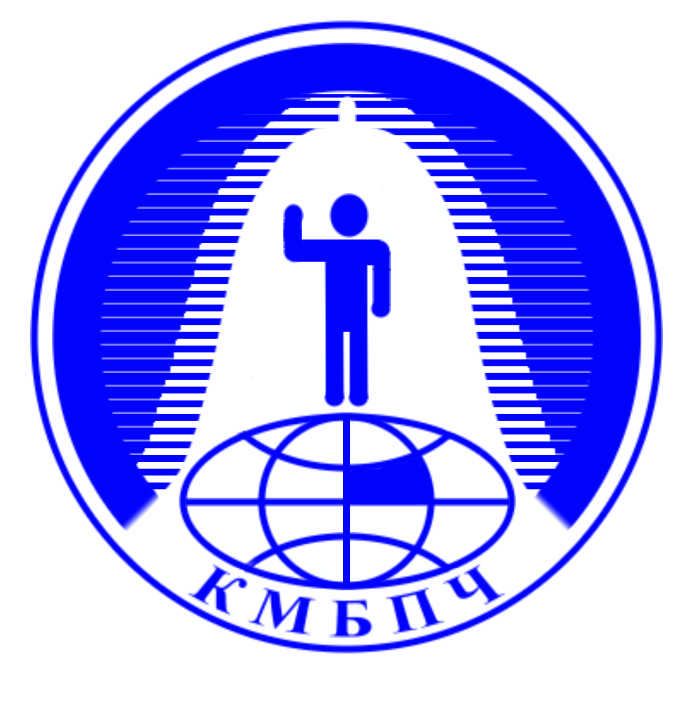
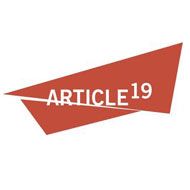
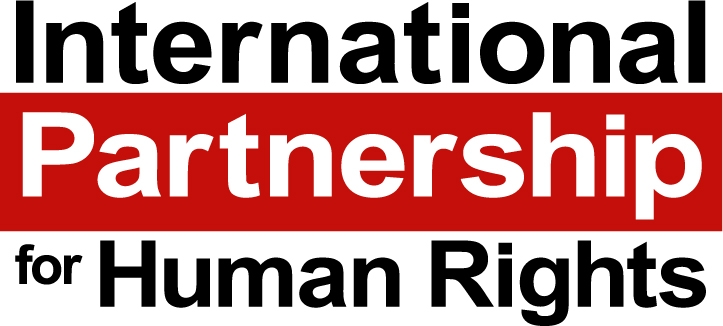

On 30 June 2015 Kazakhstani Kostanay-based lawyer Bulat Baytyakov was convicted on criminal defamation charges and sentenced to one year of restricted freedom because of appeals filed in a labour dispute in court. The defence is now appealing the verdict. We call for Baytyakov to be cleared of these charges and the verdict against him to be reversed. We also call on the relevant authorities to ensure that he and other Kazakhstani lawyers can carry out their work without intimidation and harassment and that criminal defamation provisions are not used to stifle criticism of public officials on issues concerning the administration of justice.
A legal consultant, Bulat Baytyakov provided counsel and represented a special services department of the Ministry of Interior of the Kostanay region in a court case concerning the dismissal of an officer of this department in September 2013. The police officer in question was dismissed as part of a broader campaign to discharge officers found to be ineligible for law enforcement service due to earlier criminal cases against them, in connection with which they were exempt from criminal responsibility on so-called non-rehabilitating grounds.[1] The police officer appealed this decision and in January 2014, the Kostanay City Court ruled in his favour and ordered him to be reinstated to his position. Acting on behalf of the defendant, Baytyakov in his turn appealed this decision, which he considered to be unjust and wrong and to set a dangerous precedent for similar cases. Among others, in arguing his position, he requested that the lawfulness of the actions of the judge who dealt with the case be investigated. The appeal filed by him was rejected by the Kostanay Regional Court in March 2014, a decision that was upheld by the cassation collegium of this court in June 2014 and by the Supreme Court in January 2014.
The Kostanay-based lawyer was subsequently criminally charged in relation to the appeals he filed. In its June 2014 ruling, the cassation college of the Kostanay Regional Court concluded that Baytyakov discredited the first instance judge by accusing her of unlawful actions. At its initiative, a criminal case was opened against him in August 2014, and in April 2015, the Kostanay City Prosecutor brought charges against him under Criminal Code article 411, part 3, which provides for penalties for defaming a judge in combination with accusing the judge of a serious crime. According to the indictment, Baytyakov “deliberately, being aware of the dangerous consequences for society of undermining the professional reputation” of the first instance judge and “desiring this outcome” accused her of abusing her authority and admitting false information. A psychological-philosophical expert study commissioned by the prosecutor concluded that if Baytyakov’s negative assessment of the actions of the judge are found not to correspond to reality, they may be considered denigrating.
On 30 June, Court No. 2 in the City of Kostanay handed down a verdict against Baytyakov, convicting him to one year of restricted freedom under Criminal Code article 411, part 3. During this period, he will be subjected to court-imposed control and restrictions at his place of residence.[2] Baytyakov’s lawyer is appealing the verdict.
It is highly troubling that Baytyakov has been criminally charged because of his efforts to obtain justice and protect the interests of his client, which he has a professional right and duty to do in his role as a lawyer. The arguments made by him when appealing the decision to reinstate the dismissed police officer were aimed at backing up his position, according to which this decision was not consistent with applicable legal provisions and the judge acted in violation of the requirements of the law. In a petition submitted to the Supreme Court ahead of its review of the case, the Prosecutor General of Kazakhstan also expressed strong criticism of the handling of it by the lower-level courts. He concluded that both substantial and procedural provisions of the law had been seriously violated during the consideration of the case and that the decision reached reflected an incorrect legal assessment.[3]
The right to appeal is a key element of the right to a fair trial protected, in particular, by article 14 of the International Covenant on Civil and Political Rights (ICCPR), to which Kazakhstan is a party. Moreover, lawyers play an essential role in the administration of justice and must be allowed to exercise their profession freely. As set out in the United Nations Basic Principles on the Role of Lawyers[4], the duties of lawyers include assisting clients in every appropriate way and taking legal action to protect their interests. At the same time, these Basic Principles require state authorities to ensure that lawyers are able to perform their professional functions without intimidation, hindrance, harassment or improper interference and that they are not prosecuted or punished for any action taken in accordance with recognized professional duties and standards. According to the Basic Principles, possible complaints made against lawyers in their professional capacity should be considered in disciplinary hearings in accordance with professional codes of conduct and other recognized standards of the legal profession. A recent resolution adopted by consensus by the UN Human Rights Council[5], of which Kazakhstan currently is a member, likewise emphasizes that states should ensure that lawyers are able to carry out their professional functions without interference, harassment, threats or intimidation of any kind.
The criminal charges brought against Baytyakov are also problematic in view of the right to freedom of expression. International human rights bodies have emphasized that public officials must tolerate a higher degree of criticism than other individuals and have warned against using criminal defamation charges to obstruct scrutiny of the actions of such officials. The UN Human Rights Committee, which supervises the implementation of the ICCPR, has stated that “all public figures (…) are legitimately subject to criticism” and that ”the value placed by the Covenant upon uninhibited expression is particularly high” in this context. Accordingly, the Committee has expressed concern regarding laws on the protection of the honour of public officials.[6] The UN Special Rapporteur on Freedom of Opinion and Expression and the OSCE Representative on Freedom of the Media have likewise spoken out against using the protection of the honour and reputation of public officials as a pretext to shield officials from criticism.[7] In their view, criminal defamation is “not a justifiable restriction on freedom of expression” and such provisions “should be abolished and replaced, where necessary, with appropriate civil defamation laws”.[8] Kazakhstan’s new Criminal Code, which entered into force in January 2015, retains criminal sanctions for defamation and provides special protection to public officials in this regard, despite the criticism of these provisions voiced by international human rights mechanisms such as the UN Human Rights Committee[9] and the OSCE Representative on Freedom of the Media[10].
Free speech organizations have also championed the principle of absolute privilege in relation to statements made in situations where the ability to speak freely is so vital that liability for defamation should never arise (even under civil law). Such statements are considered to include those made by lawyers and other participants in judicial proceedings, as long as those statements have some relevance to the proceedings.[11] In its comments on the application of defamation provisions, the UN Human Rights Committee has stressed that “a public interest in the subject matter of the criticism should be recognized as a defence”.[12] Issues relating to the administration of justice no doubt represent such a topic.
In view of the above, we believe that the criminal defamation charges against Bulat Baytyakov should be dismissed and the sentence against him overturned, enabling him to continue to carry out his legitimate work as a lawyer without hindrance. The authorities of Kazakhstan should stop applying the Criminal Code provisions on defamation of public officials, including judges, and decriminalize defamation in accordance with the recommendations of international human rights mechanisms and international best practice for protecting freedom of expression.
Signed by the following organizations:
Kazakhstan International Bureau for Human Rights and Rule of Law (Kazakhstan)
International Partnership for Human Rights (Belgium)
Helsinki Foundation for Human Rights (Poland)
Article 19 (United Kingdom)
Norwegian Helsinki Committee (Norway)
Netherlands Helsinki Committee (The Netherlands)
[1] The police officer in question was dismissed in relation to an incident that took place prior to his employment with the Ministry of Interior, in which he inflicted bodily harm on an underage individual, but was not held accountable since he reconciled with the victim after admitting his guilt. When applying for a job with the police, he omitted this incident from his biography, while it would have been a ground for rejecting his application in accordance with national law.
[2] In accordance with article 44 of the Criminal Code of Kazakhstan.
[3] Petition by the Prosecutor General of Kazakhstan to the Supreme Court submitted in the case of A.E. Agatanov. A copy of the petition can be provided on request.
[4] The Basic Principles on the Role of Lawyers, which were adopted by the Eighth United Nations Congress on the Prevention of Crime and the Treatment of Offenders in Cuba in 1990, are available at: http://www.ohchr.org/EN/ProfessionalInterest/Pages/RoleOfLawyers.aspx
[5] Resolution 29/L.11 adopted by the Human Rights Council on 29 June 2015. It is available at: http://ap.ohchr.org/documents/dpage_e.aspx?si=A/HRC/29/L.11
[6] Human Rights Committee, General Comment No. 34, par. 38 and 47, at http://tbinternet.ohchr.org/_layouts/treatybodyexternal/Download.aspx?symbolno=CCPR%2fC%2fGC%2f34&Lang=en
[7] See, for example, Report of the Special Rapporteur on the promotion and protection of freedom of opinion and expression to the Human Rights Council, April 2010, par. 82, at http://www2.ohchr.org/english/bodies/hrcouncil/docs/14session/A.HRC.14.23.pdf; and remarks made by OSCE Representative on Freedom of the Media in September 2012, http://www.osce.org/fom/93797
[8] Joint declaration by the UN Special Rapporteur on Freedom of Opinion and Expression, the OSCE Representative on Freedom of the Media and the OAS Special Rapporteur on Freedom of Expression, December 2002, http://www.osce.org/fom/39838
[9] Concluding observations of the Human Rights Committee on the initial report submitted by Kazakhstan under the ICCPR, July 2011, at http://tbinternet.ohchr.org/_layouts/treatybodyexternal/Download.aspx?symbolno=CCPR%2fC%2fKAZ%2fCO%2f1&Lang=en
[10] See section 3.2 of Legal Review of the office of the OSCE Representative on Freedom of the Media of the draft Criminal Code of Kazakhstan, 2013 (in Russian), at http://www.osce.org/ru/fom/104489?download=true
[11] See comment by Article 19 at http://www.article19.org/pages/en/defences-remedies.html
[12] General Comment no. 34, par. 47.



